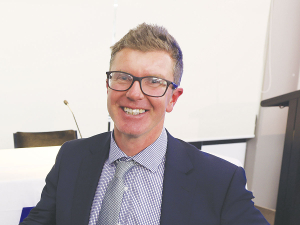Fonterra Suppliers Confident in Mainland Dairy Future
Fonterra's 460 milk suppliers in Australia, who will switch to Lactalis end of this month, are unfazed with the impending change.
 LIC chairman Corrigan Sowman says many farmers are investing in quality, efficient pastoral genetics which will put them in good stead to reduce their emissions intensity.
LIC chairman Corrigan Sowman says many farmers are investing in quality, efficient pastoral genetics which will put them in good stead to reduce their emissions intensity.
Genetics may be one of the tools Fonterra farmers can tap into to reduce on farm emissions, according to LIC.
LIC says its genetic research is leading to cows that produce less methane, are more tolerant of hotter climates, produce more kgMS of liveweight and are all-round more efficient.
LIC chairman Corrigan Sowman says many farmers are investing in quality, efficient pastoral genetics which will put them in good stead to reduce their emissions intensity, and LIC will continue to support them to do that.
Long-term users of LIC genetics have almost doubled the rate of genetic gain in their herds over the last 10 years – these gains are cumulative and permanent, delivering long-term benefits into the future, he says.
Last month, Fonterra announced they’re targeting a 30% intensity reduction in on-farm emissions by 2030 (from a 2018 baseline). LIC is well placed to support farmers to meet this target as 7% of the target is to be achieved through farming best practice with the themes of herd improvement and cow efficiency set to be influential, says Sowman.
“That’s where we come in. This announcement gives us a clear mandate to provide solutions to farmers to reduce their emissions intensity. LIC has known the challenges for some time and has been focused on supporting farmers to be profitable and sustainable in the future through cow efficiency,” he says.
“Targeting a reduction in emissions intensity cements our focus on cow efficiency as a sustainable solution for the dairy sector, and the good news is, we have the cows that will get us there – we just need more of those highly efficient cows.
“We will continue the strong focus on longevity and minimising wastage as positive gains in this area will also significantly enhance on farm profitability and enable an improved emissions profile at a herd and farm level.”
Across the national herd, the top 25% of 4–8 year-old herd tested cows are producing an average of 539 kgMS which is +166 kgMS more than the bottom 25%. The top 25% are also more efficient cows – producing an average of 1.05 kgMS per kg of liveweight (kgLWT), whereas the bottom 25% are 0.73 kgMS/kgLWT.
“We know the efficiencies that can be achieved on farm through herd improvement, and we are confident we can support farmers to reduce their emissions intensity,” says Sowman.
“My key message to farmers is – we have your backs. An emissions target that centres on intensity reduction is a positive step forward and there are many solutions out there to support you. LIC genetics is one of those solutions and we are ready to do our bit to support farmers to meet these targets.”
Each year LIC invests around $18 million into R&D (7% of revenue), making us one of the largest private investors in R&D for the primary sector. These investments are primarily focused on improving the production efficiency of the national herd for the profitability of New Zealand’s dairy sector.
Donald Trump's latest tariff tantrum has again thrown the world of trade into a new round of turmoil and uncertainty, and NZ is caught up in it.
The third edition of the NZ Dairy Expo, held in mid-February in Matamata, has shown that the KISS principle (keep it simple stupid) was getting a positive response from exhibitors and visitors alike.
Twenty years ago, South African dairy farm manager Louis Vandenberg was sent to a farm in Waikato to provide training on Afimilk technology.
Strong farmgate milk price is helping boost investment on farms, says PGG Wrightson chief executive Stephen Guerin.
Fonterra's 460 milk suppliers in Australia, who will switch to Lactalis end of this month, are unfazed with the impending change.
The 5+ A Day Charitable Trust has launched a collection of affordable recipes designed to turn everyday vegetables into seasonal stars.
OPINION: Is it a case of over promising and under delivering? Farmers think so.
OPINION: The UK dairy industry is celebrating a win after plant-based drink maker Oatly lost a long-running legal battle over…